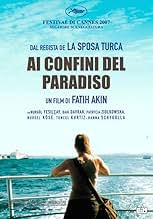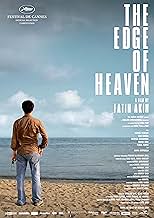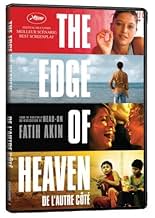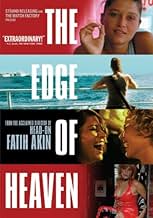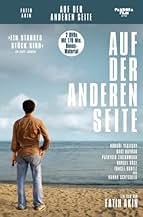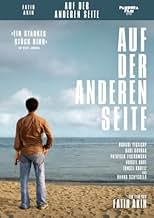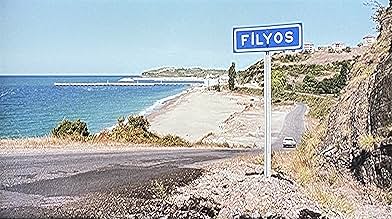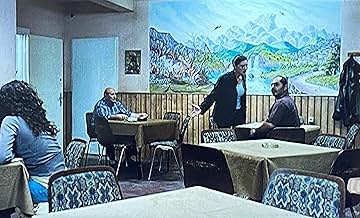NOTE IMDb
7,7/10
35 k
MA NOTE
Un homme turc se rend à Istanbul pour retrouver la fille de l'ex-petite amie de son père.Un homme turc se rend à Istanbul pour retrouver la fille de l'ex-petite amie de son père.Un homme turc se rend à Istanbul pour retrouver la fille de l'ex-petite amie de son père.
- Réalisation
- Scénario
- Casting principal
- Récompenses
- 37 victoires et 22 nominations au total
Avis à la une
"Auf der anderen Seite" is the first Faith Akin-movie I have seen, and I was surprised by how balanced and mature it was. Looking at Akin's young age and the "gang"-background of his youth, I was expecting something much louder, more brutal, more explicit, more devastating. What "Auf der anderen Seite" is, is a deeply humanistic and thoughtful movie.
The thing that I loved most about it, is that every single character is written so well. No one is a villain or a bad person per se, they're all just human, struggling to do what they think is right. The actors and actresses portraying these characters are fabulous. I've rarely seen such convincing and natural performances.
Finally, the story itself is original, unagitated and beautiful. The individual plot lines don't come together as you think they would or as you think it might be best for the characters. When the movie ends, you will find that everything did resolve in a way. It's hard to explain it, if you haven't seen it. Let's just say this: "Auf der anderen Seite" doesn't have the average Hollywood-solution, but it will leave you with a lot to think about when the credits quietly start running.
This movie really impressed me, and I can't wait to finally see Akin's other works. Apparently Germany's finally got a really interesting filmmaker deserving of all the praise he gets.
The thing that I loved most about it, is that every single character is written so well. No one is a villain or a bad person per se, they're all just human, struggling to do what they think is right. The actors and actresses portraying these characters are fabulous. I've rarely seen such convincing and natural performances.
Finally, the story itself is original, unagitated and beautiful. The individual plot lines don't come together as you think they would or as you think it might be best for the characters. When the movie ends, you will find that everything did resolve in a way. It's hard to explain it, if you haven't seen it. Let's just say this: "Auf der anderen Seite" doesn't have the average Hollywood-solution, but it will leave you with a lot to think about when the credits quietly start running.
This movie really impressed me, and I can't wait to finally see Akin's other works. Apparently Germany's finally got a really interesting filmmaker deserving of all the praise he gets.
So many films tell bland stories based on clichéd characters, whose ultimate destiny is established in the first tracking shot. But this intelligent film is based on a set of interesting individuals whose evolving personal histories quietly command attention. There's an elderly Turkish man, living in Germany, capable of both gentlemanly and violent behaviour; his son, successful but shy and unconnected to those around him; the prostitute he takes as a substitute for a wife; her politically radical daughter; the German student that the daughter falls for; and the student's mother, a conservative hausfrau with a less conservative past. Their lives intersect, but messily, not neatly, and director Faith Akin chooses to end his film before being forced to a near resolution. The film doesn't exactly make you sit on the edge of your seat; but it feels both true to life and utterly personal. It's a thoughtful movie in the best sense of that word.
This is the "Short Cut" concept once again, but in a much more clever way. It says that everybody are destined to get together. For better and for worse. We don't know it, but our movie audience understands.
This is also about the relation between Germany and Turkey and West and East at the present moment. The two are closer now than they used to be, but both parts are still hurt after each meeting. Unconditional love is hard to reach, but people try, without knowing it.
A movie about sadness but also a little about hope. Many things are too late, but some things aren't. You'll definitely sit through the final scene, for reasons which shall not be mentioned here.
This is also about the relation between Germany and Turkey and West and East at the present moment. The two are closer now than they used to be, but both parts are still hurt after each meeting. Unconditional love is hard to reach, but people try, without knowing it.
A movie about sadness but also a little about hope. Many things are too late, but some things aren't. You'll definitely sit through the final scene, for reasons which shall not be mentioned here.
The Edge of Heaven
This is such a powerful, expansive, yet intimate movie about one of the things that matters most in our times, it's hard to fault it. The acting, the events, the setting, and implications of all these characters meeting and not quite meeting, suck you in. If it seems to have a lull now and then, you end up feeling the pace of their lives, and the pace of life itself. The events, even when they have a comic twist, are so heady and difficult they could make whole films each by themselves, but here they work through several related sections within a single tapestry.
As strong as the acting is, the core of the movie is the series of events, the plot. You'll see early on some coincidences beyond reason, making the plot almost Shakespearean, and therefore artful. The roles are each character are just a little surprising, just enough to keep us curious, yet each character represents a distinctive aspect of the crosscurrents of German and Turkish cultures and worlds, such as old people assimilating and young people refusing to assimilate. Even more than the mixing of Mexican and American worlds here in the U.S., this is a dramatic and more contentious melding, fraught with all those dangers of misunderstanding we hear in the news every day. Yet when it's brought down to the level of individuals, even seemingly unyielding ones, humanity wins.
I don't know how this film will carry itself in a couple decades. As well made as it is, it feels rooted in the moment, and when the times change yet again, there might be some kind of art or magic or transcendence missing to make it fully transport a viewer. It will remain interesting, but possibly less moving. But then, maybe the themes, of parents and children, of friends looking for who they miss and avoiding who they can't stand any more, might just be universal. But as a reflection of our world right now, 2009 (or 2007, when the movie was finished), it helped clarify just what life is like out there, beyond cinematic glitter and glam, beyond hyped up violence and romance. And beyond even the limitations of documentary in creating aura.
The Edge of Heaven happens to end with such lyrical highs, the name of the movie hits you hard. We are reminded of what exists beyond all the trappings that made so many people in the previous two hours so miserable, and it's there for us to tap into and to have in common, regardless.
This is such a powerful, expansive, yet intimate movie about one of the things that matters most in our times, it's hard to fault it. The acting, the events, the setting, and implications of all these characters meeting and not quite meeting, suck you in. If it seems to have a lull now and then, you end up feeling the pace of their lives, and the pace of life itself. The events, even when they have a comic twist, are so heady and difficult they could make whole films each by themselves, but here they work through several related sections within a single tapestry.
As strong as the acting is, the core of the movie is the series of events, the plot. You'll see early on some coincidences beyond reason, making the plot almost Shakespearean, and therefore artful. The roles are each character are just a little surprising, just enough to keep us curious, yet each character represents a distinctive aspect of the crosscurrents of German and Turkish cultures and worlds, such as old people assimilating and young people refusing to assimilate. Even more than the mixing of Mexican and American worlds here in the U.S., this is a dramatic and more contentious melding, fraught with all those dangers of misunderstanding we hear in the news every day. Yet when it's brought down to the level of individuals, even seemingly unyielding ones, humanity wins.
I don't know how this film will carry itself in a couple decades. As well made as it is, it feels rooted in the moment, and when the times change yet again, there might be some kind of art or magic or transcendence missing to make it fully transport a viewer. It will remain interesting, but possibly less moving. But then, maybe the themes, of parents and children, of friends looking for who they miss and avoiding who they can't stand any more, might just be universal. But as a reflection of our world right now, 2009 (or 2007, when the movie was finished), it helped clarify just what life is like out there, beyond cinematic glitter and glam, beyond hyped up violence and romance. And beyond even the limitations of documentary in creating aura.
The Edge of Heaven happens to end with such lyrical highs, the name of the movie hits you hard. We are reminded of what exists beyond all the trappings that made so many people in the previous two hours so miserable, and it's there for us to tap into and to have in common, regardless.
In his film The Edge of Heaven (2007), under original title Auf der anderen Seite (On the Other Side), Fatih Akin, a German writer-director of Turkish parentage, intertwines two stories, whose protagonists get caught in seemingly hopeless situations, both resulting in individual tragedies, stories with a cross section on the character of a young Turkish German professor, Nejat Aksu (Baki Davrak) whom we first meet living in Bremen and lecturing in the German literature university classes, who returns to Turkey, on a (futile?) quest for the lost daughter of his father's suddenly deceased girlfriend, and (unexpectedly?) stays there where he, quite appropriately to his vocation and interests, buys and maintains an Istanbul bookstore with exclusively German books (or books translated in to German) on offer, two stories which gradually approximate each other, but never actually "resolve" one in to another. Still, the end is open, with the possibility for resolution, future cleansing what-so-ever, of the souls heavily burdened with guilt from the past.
Film touches real life situations, ranging from usual family tensions and quarrels, through losses suffered due to physical separation or emotional disorder, all the way to ultimate loss, death of the dear one, and in doing so engages audiences on the first-person level, because nobody is spared from at least a single such experience, or two or more. Such an easy and deep identification with on-screen happenings, with how they develop, how they are mended or not... is what we feel all along, and what we carry out of the theatre when the film is over... Split between two sides, Life and Death on the edge, but who's to tell which side is the Heaven and which one is the Hell?
Heavy matters tackled, yet easy to relate to, feel for affected characters and empathize with them, in an emotionally charged and very engaging film.
Film touches real life situations, ranging from usual family tensions and quarrels, through losses suffered due to physical separation or emotional disorder, all the way to ultimate loss, death of the dear one, and in doing so engages audiences on the first-person level, because nobody is spared from at least a single such experience, or two or more. Such an easy and deep identification with on-screen happenings, with how they develop, how they are mended or not... is what we feel all along, and what we carry out of the theatre when the film is over... Split between two sides, Life and Death on the edge, but who's to tell which side is the Heaven and which one is the Hell?
Heavy matters tackled, yet easy to relate to, feel for affected characters and empathize with them, in an emotionally charged and very engaging film.
Le saviez-vous
- AnecdotesNurgül Yesilçay - who is a big star in her native Turkey - had doubts about taking on the part of Ayten as she wasn't sure how audiences would react to seeing her as a revolutionary lesbian.
- GaffesIn the film, the year is 2006 and it is the Festival of Sacrifices (Kurban Bayrami), a religious holiday. Everybody is in summer clothes and many of them are sweating. The Festival of Sacrifices in 2006 in Turkey was in winter, at the end of December.
- Citations
story: After telling the story of Abraham that was willing to sacrifice his son, Ismael, to show God his obedience. Before Abraham could slay his son God sent a lamb to sacrifice instead.
Nejat Aksu: I asked my dad if he would have sacrificed me as well.
Susanne Staub: And what did he say?
Nejat Aksu: That he would even make an enemy of God to protect me.
- Crédits fousThe film's title appears twice: in the middle of the film at 1 hour 25 mins and after the end credits.
- ConnexionsFeatured in Fatih Akin - Tagebuch eines Filmreisenden (2007)
Meilleurs choix
Connectez-vous pour évaluer et suivre la liste de favoris afin de recevoir des recommandations personnalisées
- How long is The Edge of Heaven?Alimenté par Alexa
Détails
- Date de sortie
- Pays d’origine
- Sites officiels
- Langues
- Aussi connu sous le nom de
- The Edge of Heaven
- Lieux de tournage
- Sociétés de production
- Voir plus de crédits d'entreprise sur IMDbPro
Box-office
- Montant brut aux États-Unis et au Canada
- 742 349 $US
- Week-end de sortie aux États-Unis et au Canada
- 14 257 $US
- 25 mai 2008
- Montant brut mondial
- 17 804 565 $US
- Durée1 heure 56 minutes
- Couleur
- Mixage
- Rapport de forme
- 1.85 : 1
Contribuer à cette page
Suggérer une modification ou ajouter du contenu manquant

Lacune principale
By what name was De l'autre côté (2007) officially released in India in English?
Répondre

